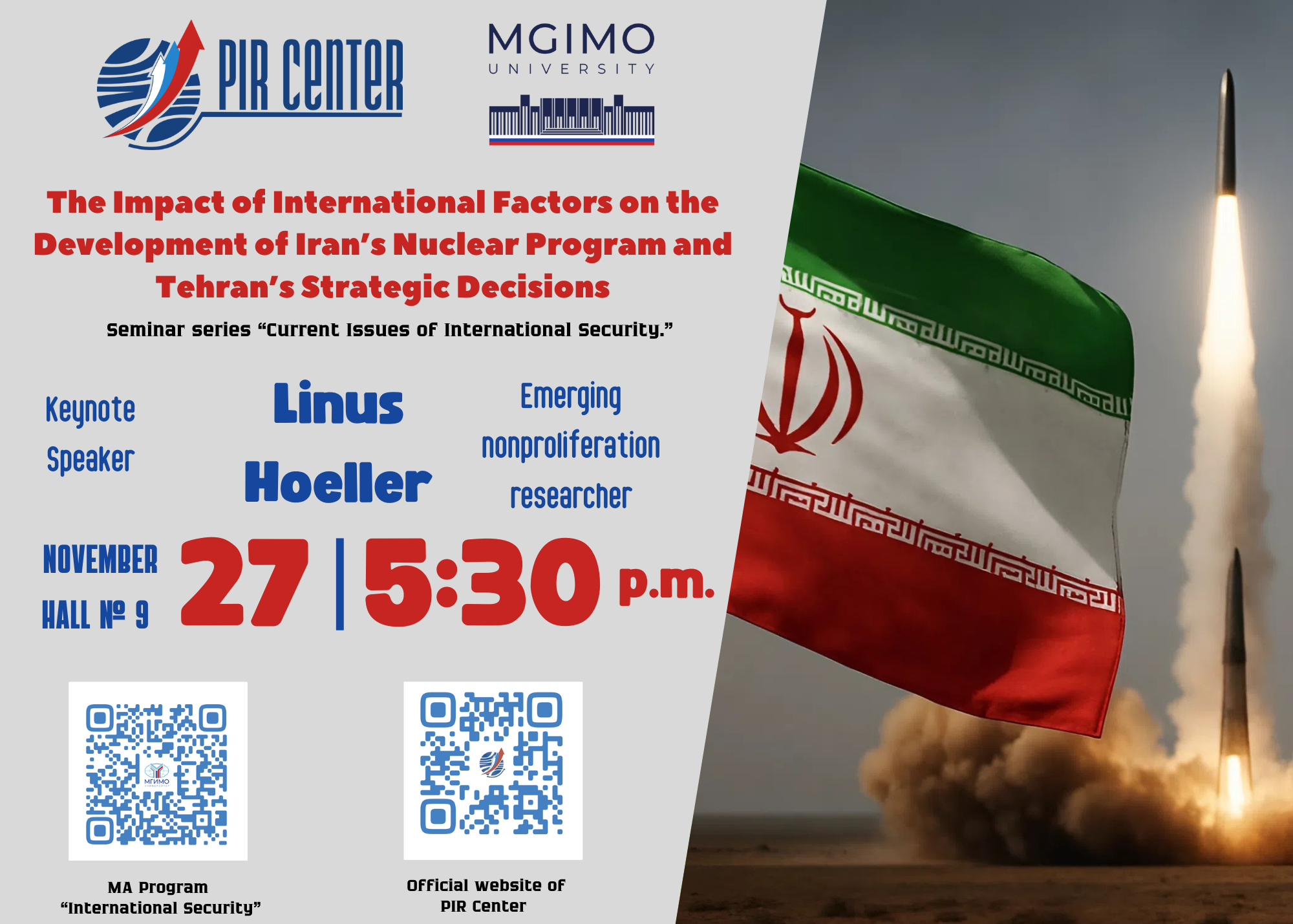“Different forms of international pressure – diplomatic, economic, military, normative, and covert – have had varying impacts on Iran’s decisions regarding its nuclear program during different historical periods. While economic sanctions and multilateral diplomacy have proven effective in changing Iran’s calculations, pressure alone in any of these forms has been insufficient and often led to counterproductive outcomes. Globally coordinated actions have been far more effective than unilateral or regional efforts to curb nuclear proliferation, as they influence Iran’s internal calculations. One notable pattern is initial resistance, which is later followed by quiet acquiescence – a strategic response aimed at balancing external pressure with internal demands for legitimacy,” said Mr. Linus Hoeller, nonproliferation Researcher.
⚡ On November 27, PIR Center, jointly with MGIMO University, will hold an expert seminar on the topic “The Impact of International Factors on the Development of Iran’s Nuclear Program and Tehran’s Strategic Decisions.”
The event is part of the seminar series “Current Issues of International Security.”
The keynote speaker will be Mr. Linus Hoeller, a researcher specializing in nonproliferation.
Mr. Linus Hoeller will outline the key findings of his Report “Foregone Conclusion? The Interactions Between Global Actions and the Iranian Nuclear Program (1959–2025),” which examines how international factors – diplomatic, sanctions-related, military, normative, and covert – have influenced the trajectory of Iran’s nuclear program over more than six decades.
The seminar will be structured around the following thematic blocks:
- Iran’s nuclear program under the Shah: the influence of Western states, early technological projects, and the reasons behind Iran’s early accession to the NPT;
- The Iran-Iraq War as a turning point: Iraq’s use of chemical weapons, Iran’s heightened sense of strategic vulnerability, and the revival of covert nuclear activities;
- The crisis of the early 2000s: the discovery of facilities in Natanz and Arak, the response of the IAEA and the international community, and the formation of a comprehensive sanctions regime;
- The JCPOA period: complex negotiations involving the United States, the EU, Russia, and China, the economic implications of the agreement, and their influence on Tehran’s decision-making;
- Developments after the U.S. withdrawal from the JCPOA: Iran’s steps to reduce its commitments, the growth of its technical capabilities, and the intensification of covert operations surrounding the nuclear program;
- International instruments of pressure: how diplomacy, sanctions, threats of force, and international norms shaped the key turning points in the evolution of Iran’s nuclear program.
During the seminar, participants will discuss why international initiatives to limit Iran’s nuclear
program produced such mixed results, which internal and external factors guided Tehran’s decisions at various historical stages, and how the evolution of Iran’s nuclear policy reflects broader shifts in the global security architecture.
Special attention will be given to the current situation, including Iran’s accelerated expansion of its technical capabilities, growing regional tensions, uncertainty in U.S.-Iran relations, and the impact of increasing multipolarity on the nonproliferation regime.
Possible scenarios for the further development of Iran’s nuclear program, prospects for returning to JCPOA-type agreements, and the role of international norms and confidence-building measures in reducing the risk of escalation in the Middle East will also be examined.
Format and Conditions of Participation
The event will be held on November 27 at 5:30 p.m. (Moscow Standard Time) in a hybrid format:
• Offline: MGIMO University, Hall 5. For external guests who would like to participate in the event in person and do not have an MGIMO pass, please contact Mr. Yuriy Shakhov, Editor at Information, Publications and Digital Communications Program, PIR Center, via e-mail: inform@pircenter.org.
• Online: broadcast via Yandex.Telemost platform.
🔹 The working language is English. 🔹
Registration for online participants is mandatory (until 12:00 p.m. on November 26, 2025).
For questions about participation, please contact Mr. Yuriy Shakhov, Editor at Information, Publications and Digital Communications Program, PIR Center, via e-mail inform@pircenter.org.


